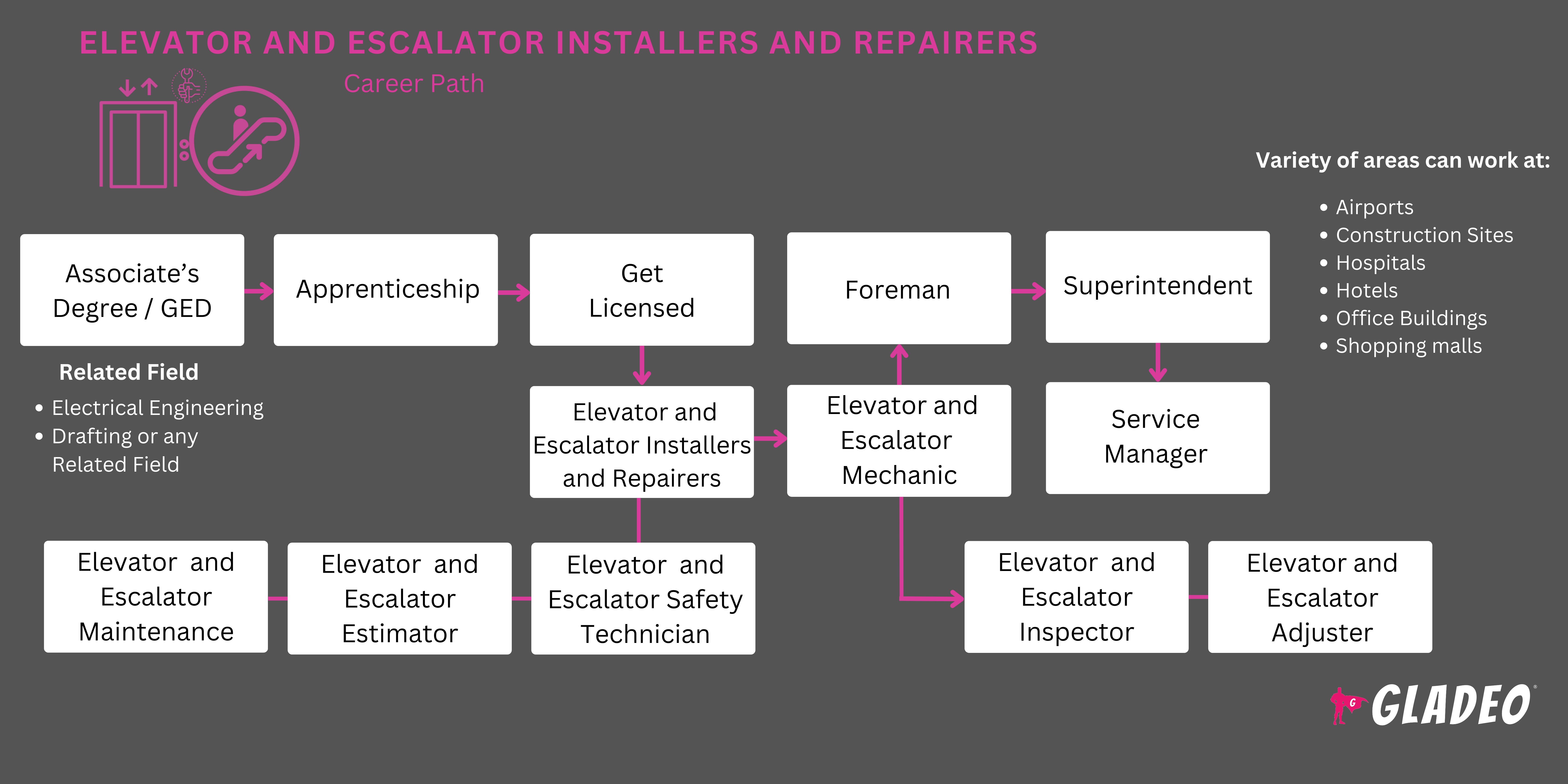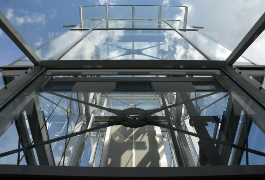Focos
Ajustador de ascensores, constructor de ascensores, mecánico de ascensores, técnico de reparación y mantenimiento de ascensores, mecánico de servicio de ascensores, técnico de servicio de ascensores, técnico de ascensores, técnico de ascensores, técnico de ascensores, técnico de escaleras mecánicas.
Como habrás adivinado, los instaladores y reparadores de ascensores y escaleras mecánicas instalan nuevos ascensores y escaleras mecánicas en edificios y, a continuación, realizan tareas de mantenimiento, resolución de problemas y reparación según sea necesario. También pueden instalar pasillos rodantes como los de los aeropuertos, así como otros tipos de ascensores. Estos trabajadores son expertos en hidráulica, motores, componentes eléctricos que alimentan los equipos y sistemas informáticos que los controlan.
En trabajos de gran envergadura en los que hay que cambiar los cables o los cojinetes de los ascensores, es posible que se llame a un equipo para que realice el trabajo lo más rápido posible. Muchos edificios altos dependen en gran medida del funcionamiento correcto y seguro de sus ascensores, al igual que los centros comerciales, el metro, los aeropuertos y otros centros de gran afluencia necesitan que sus escaleras mecánicas estén en funcionamiento en todo momento. Por eso, los instaladores y reparadores de ascensores y escaleras mecánicas son tan importantes en la sociedad moderna actual, aunque no siempre veamos su arduo trabajo entre bastidores.
- Desempeñar un papel crucial para garantizar que todas las plantas del edificio sean accesibles para los visitantes, empleados o inquilinos.
- Trabajar en un campo que ayuda a personas con discapacidades físicas que no pueden usar escaleras.
- Permitiendo la construcción de edificios de gran altura que no podrían existir sin ascensores.
Horario de trabajo
Los instaladores y reparadores de ascensores y escaleras mecánicas trabajan a tiempo completo con posibilidad de horas extras en caso de plazos ajustados. También pueden tener que estar disponibles para emergencias.
Funciones típicas
- Revisar los planos de los diseños.
- Evaluar el trabajo que hay que hacer, incluyendo todos los sistemas afectados.
- Construir cabinas de ascensor; instalar escaleras mecánicas, pasillos rodantes, telesillas y equipos relacionados.
- Instalar contrapesos
- Atornille o suelde los rieles a las paredes interiores del eje.
- Conecte los paneles de control y los motores, y compruebe que funcionan correctamente y que el consumo de energía es el adecuado.
- Realice los pasos generales de resolución de problemas para determinar las causas del problema.
- Repare o sustituya los frenos, motores, interruptores u otras piezas defectuosas que no funcionen correctamente.
- Asegúrese de que el mantenimiento general se complete de manera oportuna.
- Desmonte el equipo utilizando diversas herramientas.
Responsabilidades adicionales
- Mantener registros/registros de todo el trabajo realizado.
- Cumplir con todos los códigos de seguridad de construcción, locales o estatales, según corresponda.
- Utilice todo el equipo de protección personal.
- Responder rápidamente a las emergencias, como cuando una persona queda atrapada dentro de un ascensor.
Habilidades sociales
- Cómodo con las alturas
- Centrado en los detalles
- Coordinación mano-ojo
- Paciencia y perseverancia
- Resolución de problemas
- Orientado a la seguridad
- Resistencia y fuerza
Habilidades técnicas
- Controles del ascensor
- Programas de gestión de instalaciones
- Lectura de planos
- Habilidades mecánicas como el uso de herramientas, incluyendo herramientas como registros gráficos, indicadores de presión, máquinas de soldar, medidores de voltaje, sopletes, comprobadores de circuitos, dobladoras de conductos, sierras para metales, polipastos, niveles, micrómetros, multímetros, ohmímetros, fasímetros, plataformas elevadoras, taladros eléctricos, balanzas de resorte, soldadores, eslingas, tacómetros, tensiómetros, radios bidireccionales y muchas más.
- Conocimientos generales de física, matemáticas y construcción de edificios.
- Contratistas de equipamiento para edificios
- Instituciones educativas
- Organismos gubernamentales
Los instaladores y reparadores de ascensores y escaleras mecánicas trabajan duro para garantizar el correcto funcionamiento de equipos potentes que pueden ser peligrosos si no se instalan correctamente o no funcionan adecuadamente. En particular, los ascensores transportan a personas a grandes alturas, varios pisos por encima del suelo. Por lo tanto, los trabajadores de estos campos tienen la enorme responsabilidad de asegurarse de que los equipos funcionen según lo previsto y de detectar y solucionar cualquier problema antes de que se convierta en algo grave. También se espera que respondan con rapidez cuando se les comunique una emergencia.
Se prevé que los instaladores y reparadores de ascensores y escaleras mecánicas seguirán teniendo demanda en los próximos años, ya que se están construyendo más edificios y estos son más altos que nunca. Al mismo tiempo, existe una gran presión para aumentar la accesibilidad de las personas con limitaciones físicas, lo que significa que las zonas que antes solo tenían escaleras pueden necesitar la instalación de medios de acceso adicionales, como ascensores. Afortunadamente, también se presta más atención a las cuestiones de seguridad en los edificios antiguos, lo que incluye garantizar el mantenimiento y la reparación completos de los ascensores. Cuando se instala equipo nuevo, suele ser más avanzado tecnológicamente, por lo que la Oficina de Estadísticas Laborales prevé que los nuevos trabajadores que se incorporen al sector con formación en electrónica serán los más competitivos en el mercado laboral.
Es probable que a los trabajadores de este campo siempre les haya gustado arremangarse y ponerse manos a la obra con proyectos complicados. Les gustan las cosas mecánicas grandes y es posible que prefieran trabajar en interiores en lugar de estar al aire libre expuestos a las inclemencias del tiempo. Dado que los ascensores y las escaleras mecánicas tienen muchos controles eléctricos, es probable que los instaladores y reparadores hayan estudiado temas relacionados con la electricidad en la escuela o incluso por su cuenta como hobby. Son meticulosos y precisos, y se enorgullecen de garantizar que sus proyectos funcionen tal y como se han diseñado.
- Se necesita un título de secundaria o GED para empezar.
- Cualquier experiencia laboral relevante será útil para obtener la titulación.
- La mayoría de los instaladores y reparadores de ascensores y escaleras mecánicas aprenden mediante un aprendizaje de cuatro años y formación en el puesto de trabajo, que incluye formación técnica.
- La mayoría de los estados exigen una licencia (actualmente 35 lo hacen y 15 no), y es probable que los empleadores esperen que los trabajadores tengan un permiso de conducir válido y vigente para poder responder rápidamente cuando sea necesario.
- Las certificaciones opcionales incluyen:
- Asociación Nacional de Contratistas de Ascensores -
- Técnicos certificados en ascensores (CET)
- Técnicos certificados en accesibilidad y ascensores para residencias privadas (CAT)
- Asociación Nacional de Autoridades de Seguridad de Ascensores Internacional
- Inspectores de ascensores cualificados (QEI)
- Asociación Nacional de Contratistas de Ascensores -
- Según O*Net, el 40 % de los instaladores y reparadores de ascensores y escaleras mecánicas comienzan con solo un título de secundaria; el 36 % completa algunos estudios universitarios.
- Las clases recomendables para progresar incluyen seguridad, matemáticas, lectura de planos, electrónica y, si están disponibles, cursos que cubran las piezas de ascensores y escaleras mecánicas.
- Consulte el sitio web de la Asociación Nacional de Contratistas de Ascensores para obtener más información sobre los requisitos previos para el aprendizaje y tome clases que le ayudarán a obtener la calificación.
- Busca programas que reúnan los requisitos para recibir ayuda federal con fondos de la beca Pell, si presentas una FAFSA.
- Revisa la información sobre cualquier ayuda para encontrar trabajo después de terminar el programa.
- Decida si desea especializarse en la instalación de ascensores o escaleras mecánicas.
- Trabaja en empleos a tiempo parcial que te permitan adquirir experiencia con los sistemas pertinentes y manejar los tipos de herramientas que necesitarás para obtener la cualificación.
- Considera la posibilidad de adquirir experiencia práctica con herramientas a través de Hábitat para la Humanidad.
- Toma clases pertinentes, como matemáticas, lectura de planos y electrónica.
- Obtenga la certificación en primeros auxilios y aprenda sobre los protocolos de seguridad y los códigos de construcción aplicables.
- Busque formación a través de la Asociación Nacional de Contratistas de Ascensores.
- ¡Habla con instaladores de ascensores y escaleras mecánicas en activo y descubre cómo es realmente el trabajo desde dentro! Pregúntales cómo consiguieron su puesto de aprendiz, si completaron uno.
- Prepárate viendo vídeos tutoriales y asistiendo a cursos cortos no universitarios.

- Busca empleos locales en Indeed, Monster, Craigslist y Glassdoor.
- Completa tanta experiencia laboral práctica o tantos cursos académicos como puedas para poder optar a un puesto de aprendiz.
- Obtenga la certificación en primeros auxilios.
- Si solicitas un puesto de aprendiz, es posible que tengas que pasar una prueba de aptitud y presentar un currículum, así que añade toda tu experiencia laboral y académica relevante y enumera las herramientas que sabes utilizar.
- Busca ejemplos de currículums en Internet y adáptalos al puesto de aprendiz o al trabajo que solicitas.
- Pide a un editor profesional o a un amigo con conocimientos de inglés que revise tus materiales de solicitud.
- Aprende el vocabulario del sector y estudia preguntas reales de entrevistas.
- Domina tus funciones y presta mucha atención durante toda la formación en el puesto de trabajo.
- Demuestra que eres una persona íntegra, fiable y con aptitudes para el trabajo.
- Realiza cursos avanzados si son adecuados para el puesto que ocupas o el que deseas.
- Los trabajadores pueden tener la oportunidad de convertirse en mecánicos o asistentes de mecánicos. Pregunte a su empleador con antelación sobre las oportunidades específicas de crecimiento profesional y hágale saber que desea optar a ellas, pero primero domine las habilidades y herramientas de su trabajo actual.
- Demuestra que puedes trabajar por tu cuenta sin supervisión.
- Certificaciones completas, tales como:
- Asociación Nacional de Contratistas de Ascensores -
- Técnicos certificados en ascensores (CET)
- Técnicos certificados en accesibilidad y ascensores para residencias privadas (CAT)
- Asociación Nacional de Autoridades de Seguridad de Ascensores Internacional
- Inspectores de ascensores cualificados (QEI)
- Termina tu aprendizaje y conviértete en oficial.
- Asociación Nacional de Contratistas de Ascensores -
Sitios web
- Unión Internacional de Constructores de Ascensores
- Programa educativo nacional para la industria de los ascensores
- Asociación Nacional de Contratistas de Ascensores
- Asociación Nacional de Autoridades de Seguridad de Ascensores Internacional
- De cascos a cascos de seguridad
Libros
- Solución de problemas y reparación de ascensores: guía de estudio para la certificación de técnicos, por David Herres, doctor en Filosofía.
- El Manual de transporte vertical, por George Strakosch y Robert Caporale (editores)
- Mecánico de ascensores (Serie de exámenes profesionales), por National Learning Corporation
Los instaladores y reparadores de ascensores y escaleras mecánicas tienen unas perspectivas laborales sólidas, pero eso no significa que no puedas considerar otras opciones. En las ocupaciones relacionadas de la BLS se citan algunas carreras alternativas, entre las que se incluyen:
- Caldereros
- Instaladores y reparadores de equipos eléctricos y electrónicos
- Electricistas
- Mecánicos de maquinaria industrial, trabajadores de mantenimiento de maquinaria y mecánicos industriales.
- Trabajadores del hierro
- Trabajadores metalúrgicos
- Técnicos de aerogeneradores
Fuente de noticias

Empleos destacados

Cursos y herramientas en línea

Expectativas salariales anuales
Los nuevos trabajadores comienzan con un salario de alrededor de 96 000 dólares. El salario medio es de 132 000 dólares al año. Los trabajadores con mucha experiencia pueden ganar alrededor de 160 000 dólares.







